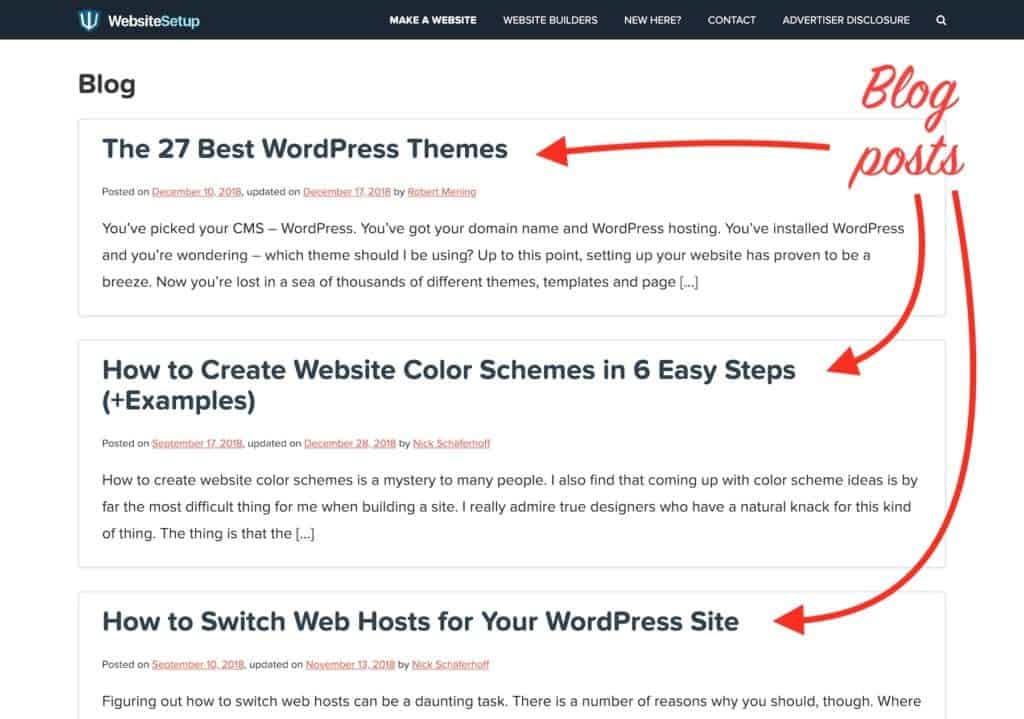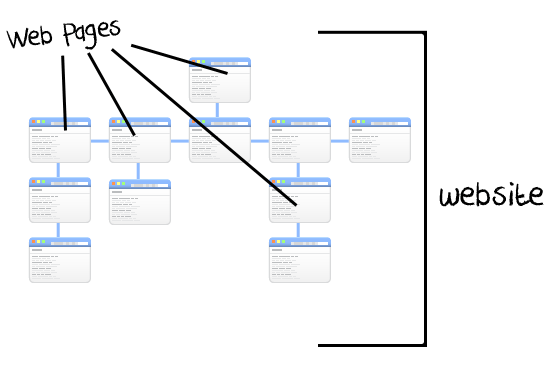Full guide for the difference between blog and website: Though many might think of WordPress blog and WordPress website to be very similar, there still lies a number of differences between blog and website. WordPress is a Content Managing Server or CMS that will help you in building up your own blog or website free of cost.
With numerous features, WordPress provides you with a platform to express and expand your creativity and share your knowledge with others. WordPress is very popular nowadays because of the easy SEO. It has been a very important tool to strengthen the virtual presence of any organization or business.
Now, let’s come to the point. Lots of people do not really understand the differences between a web page and a website. They might be very relevant but indeed are two distinct areas. Before we talk about the differences between blogs and websites in WordPress, let’s clear the air in a generalized way at first.
Contents
Blog vs. Website
A blog is just one kind of website. Websites can be of different types. They can have content in the form of texts, audio, video, and many more. But blogs are specifically in text forms. The aim is that the most recent posts will appear on top, whoever visits the blog. This is how it may seem:

The blogger is free to share his information, news, articles, stories, or anything that he is willing to write about. They can add or share images on their relevant topics too. CMS or Content Management System (e.g. WordPress) is a tool to edit blog content quickly without the knowledge of programming or web development.
In contrast, websites do not have such requirements to operate. They can also use CMS along with many other tools like HTML or static.
WordPress Blog and WordPress Website
The difference between a blog and a website in WordPress is not much different than the difference between any other blog and website. As said earlier, blogs are basically for writing whatever you want. You can explore your creativity in story writing or article writing.
That doesn’t necessarily need to catch the right audience. But if you can create a community or a good number of visitors, you can get lucky enough to make serious money too.
Some of the prime differences to observe between WordPress blogs and WordPress websites are:
- The actual difference between blogs and websites is that blogs require regular updates with new and fresh content that shows on top of any server or website engine. On the other hand, websites are not much dynamic. They don’t get renewed as frequently as blogs as content is maintained on web pages.
- Blogs can draw attention in a broader span, and clients can educate themselves fast and efficiently. Websites can’t do so.
- We can consider every blog as a website, but not all websites are identified as blogs.
- Blogs are interactive as visitors can put their comments too. On the other hand, there is no such way of communication in the case of a website. It is one-way communication.
- Blogs can appear as a platform where one can learn a lot of things covering different sectors, whereas a website is more like information about products and their services.
- Blogs use tags and categories to keep the contents organized, whereas websites have web pages for that.
- You don’t need to have a business purpose for running a blog. But if you are anyhow working for your organization, you should have a website. It is vital to keep the basics organized.
Which One to Use for Business?
If you are a newcomer to online business, this might bother you. You might face a little difficulty in choosing what is better for you – A blog or a Website. Both of them have a different range of reach and are beneficial in different ways. It depends on you actually how you feel comfortable running your business.
If you are willing to only write about your products and add pictures of them, then a blog can work absolutely fine. However, using a WordPress website can open different doors. You can also add videos and audio podcasts to promote your business. Again, this depends a lot on what kind of business it is.
However, it has been shown in studies that blogs are much better to go for if you are a beginner. This works very effectively without any mess if you know how to operate it. And with WordPress, blogs are significantly easier to run. Some of the benefits you will get using a WordPress blog:
- Blogs can engage visitors up to 55% more than any other standard website.
- People enjoy reading blogs more than surfing around websites as blogs can come up with new and more relevant posts that one is looking for. Even search engines like Google loves blogs over standard websites.
- Any new posts of yours will be automatically notified to Google by WordPress and thus will invite them to index your original post. This kind of feature is not provided by Static Websites.
- Ever noticed how social media can be a great help to promote any business? Well, you can’t deny that the best promotion happens on social media these days. And needless to say, blogs are more accessible to share on social media than sharing your website content. Consider you share your website on Facebook or Instagram. What do you do after another new post? You can’t share the same website and make people go through the same pages again. This only creates boredom, and your visitors will decrease rather than increase. But with blogs, you can always share any new content without taking all the fun out.
Another feature of using a blog is that you have to keep up with the world and update it with new content regularly. For beginners, this might work in a good way as this will increase your blog activity and make a good promotion of your business. But, if you are busy and don’t have much time for new content every week, it might turn out as a drawback for you. In that case, you can choose static websites as a one-time effort.
Get All in One with WordPress
No wonder both websites and blogs have their own ways provided to help to organize your business. If you are well in deciding what features you want, you are good to go. But making a decision can be challenging for some people. Moreover, it gets confusing at times to choose one where you have to let go of all the useful features of another. Don’t worry at all.
There are some servers or CMS tools that can help you in this kind of situation. WordPress is a Content Managing System (CMS) that can provide both blog and website facilities. You can build your very own website with blog software. This way, you will still have a professional appearance online and yet share your blogs with fresh content on social media to keep your followers entertained.
Blog software provides not only blog pages but also static web pages as both are important for successful internet exposure. Some benefits that will please you include:
- Easy optimization for SEO
- Available plugins to share between blog posts and pages
- A homogeneity in appearance
- Easy and fast web designing and page development
- Easy maintenance and content update due to the CMS tool-based infrastructure
Here, we must mention that many people mix up the two terms – website and web page. They are also not the same. Let us get you through this quickly.
Webpage vs. Website
In one sentence, a web page offers information or knowledge as a single entity whereas, on the other hand, a website can appear as a combination of multiple web pages. However, we believe this sentence is not enough for you to understand the details. Let’s dig a bit deeper than that.

What Does a Web Page Mean?
A web page can be considered a solitary page of a website. You can access the web page through any browser by using just a URL. And anyone can copy or share this web page. It won’t require any navigation if one wants to visit or view the web page.
The contents of a web page include audio, videos, graphics, plain texts as information, and even hyperlinks of other pages that you can download if you want to. Web pages can display their contents including the remote files, via the connection with the server. HTML, PHP, Python, Perl, etc. are used for their programming. Therefore, they have a more straightforward display, unlike websites.
Two categories of web pages are found:
- Static web page: This type of web page involves processes that are very time-consuming. It is because, when there is any change in information, the modification must show on the website. And this change has to be incorporated on each web page manually by the user.
- Dynamic web page: Dynamic web page uses a central database in order to store any product information. Any changes that are needed can be placed on a single web page where the database-regulated approach can collect them. This way, the data can be extracted when needed and used for multiple web pages.
What Does a Website Mean?
A website is a collective form of similar or relatable web pages that are located under the same domain. Many organizations and business groups can create their own websites. They can be created and maintained for various purposes. There are no rules about what page they should contain, but the standard pattern of having a home page, about page, contact details page, and other categories are commonly followed by many.
A website cannot have an index but must contain a navigation bar that can lead back to the home page with just one click. The website requires to be hosted by a server for display.
What is the Difference between a Webpage and a Website?
From the definitions stated above, hopefully, the idea of a website and a web page is pretty clear to you now. Take a quick view of some of the key differences between a web page and a website:
- A web page is an individual part of a website where a website is a combined platform of relevant web pages.
- Multiple web pages might share the same name, but each website should have a particular URL.
- A website displays contents where web pages are sub-contents or contents categorized on a website.
- HTML, PHP, HTM, etc. are extensions of the URL used in a web page. There is not any URL extension for a website.
- The address of a web page is dependent on the website or its domain. On the other hand, the website address does not depend on the web page address.
- It is a lot easier to design a web page than to develop and maintain a website as there are multiple web pages to work on.
See also:
1- Blog vs Website: What Is the Difference and Which Best One Is for You?
2- WordPress vs Shopify Which Is Better for You?
3- How to Transfer Wix to WordPress: Everything You Need to Know
Conclusion
Websites and blogs are two different sectors providing different results. They work in different ways, and both are helpful in aiming for various purposes. They can get you the expected result that you are looking for in your business.
Blogs can be a perfect solution to expand your creativity no matter what you do. And this can build up an excellent reputation of yours on the internet covering social media. People now get to be influencers on social media by sharing their day-to-day lifestyles.
And a good website can give you a much more professional appearance and make a great deal to increase your online exposure. In short, both of them are important enough to provide you with a strong presence in the virtual world. And why do you have to choose just one when you can have both with the help of WordPress?





